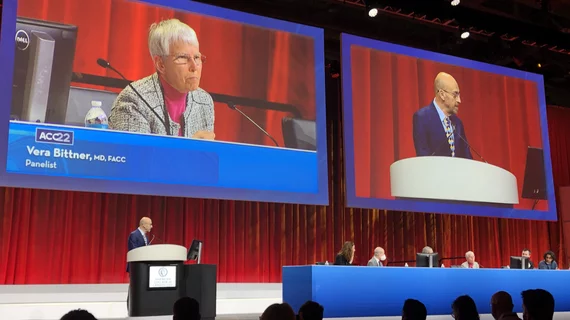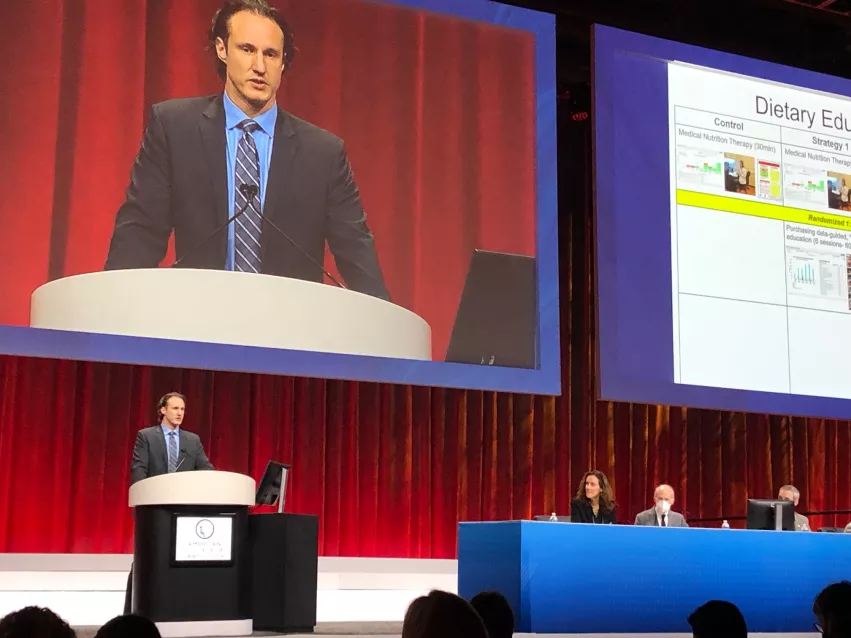Cholesterol medications, flu shots and heart failure: Day 2 at ACC.22
ACC.22, the American College of Cardiology’s 71st Annual Scientific Session & Expo, is officially underway in Washington, D.C.
The conference’s second full day, April 3, included a wide variety of late-breaking clinical trials that were collaborations with the Journal of the American Medical Association (JAMA) or New England Journal of Medicine (NEJM).
Brian Bergmark, MD, a cardiologist at Brigham and Women’s Hospital in Boston, kicked off the JAMA collaborations by presenting results from the TRANSLATE-TIMI 70 trial. Overall, he and his colleagues found the cholesterol medication vupanorsen was associated with modest reductions in non-HDL cholesterol among adult patients who were already on statin therapy. It remains unclear, however, if these reductions were significant enough for vupanorsen to be considered a valid option for further development.
Lorenz Räber, MD, PhD, cardiology professor and director of the catheterization laboratory at Bern University Hospital in Switzerland, was next. Räber was the lead investigator of the PACMAN-AMI trial, which found that the PCSK9 inhibitor alirocumab, when combined with high-intensity statin therapy, was associated with “incremental coronary plaque regression, lipid core reduction and plaque stabilization” among patients undergoing PCI after an acute myocardial infarction (AMI).
The team’s analysis, which included 300 AMI patients with an average age of 58.5 years old, is the first to investigate alirocumab’s potential impact on these vulnerable plaques. Patients received either alirocumab or a placebo for a full year.
The next late-breaking clinical trial focused on results from the APOLLO trial, a small, first-in-man study that explored the effect of SLN360, a small interfering RNA (siRNA), on a patient’s cholesterol levels. Overall, lead author Steven E. Nissen, MD, a cardiologist with the Cleveland Clinic, reported to the ACC.22 audience that the siRNA was linked to significant reductions in lipoprotein(a), low-density lipoprotein (LDL) cholesterol and apolipoprotein B-100.
Nissen said that he and his team were “surprised” by the emphatic success of this treatment. And though much more research is still clearly needed—the study only included a total of 32 patients — he told attendees that “we think optimism is warranted.”
Learn. more in the VIDEO: Use of mRNA drug to lower lipoprotein(a) by up to 98% — interview with Steven E. Nissen, MD.
Dylan L. Steen, MD, an adjunct associate professor of medicine at the University of Cincinnati College of Medicine, took the stage next to share details about his collaboration with Kroger supermarkets, the SuperWIN trial.
The study focused on providing adult patients ages 21 to 75 years old with supermarket- and web-based educational materials focused on nutrition. While the study’s control group received a single in-store counseling session from a dietician, one group of patients received six additional one-on-one in-store sessions. Another group, meanwhile, received a total of seven one-on-one in-store sessions in addition to training focused on online shipping, identifying healthier foods, meal planning and more.
Overall, Steen et al. found these in-store counseling sessions were associated with improved adherence to the Dietary Approaches to Stop Hypertension (DASH) diet; this was even true for the control group.
“We need to spark a new era of research in this field,” Steen told attendees.
Additional research presented at ACC.22:
The second wave of late-breaking clinical trials included a study led by Mark Loeb, MD, the Michael G. DeGroote chair in infectious diseases at McMaster University in Ontario, Canada. Loeb et al. found that heart failure patients may see some additional benefits—including a lower risk of pneumonia or hospitalization for a full year—if they receive their annual flu shot. However, the study failed to meet its primary endpoint; no significant difference was seen when it came to major adverse cardiovascular events.
“When taken together with previous trials and observational studies, the collective data demonstrate there is a substantial benefit to receiving a flu vaccine for people with heart failure,” Loeb said in an ACC statement.
The findings from another key trial were presented by G. Michael Felker, MD, a professor of medicine with the Duke Clinical Research Institute. Felker, a co-author of the METEORIC-HF trial, shared that omecamtiv mecarbil did not appear to help heart failure with reduced ejection fraction (HFrEF) patients improve their exercise capacity. Omecamtiv mecarbil had previously been linked to multiple benefits for HFrEF patients, but this is one area where the medication does not appear to make an impact.
In addition, Javed Butler, MD, MPH, MBA, president of the Baylor, Scott & White Research Institute in Dallas, reported his team’s findings from the DIAMOND trial. Overall, the group found, HFrEF patients taking RAASi medications have much lower blood potassium levels if they take patiromer as opposed to a placebo.
This finding suggests that HFrEF patients no longer need to limit RAASi therapy due to hyperkalemia.
Tariq Ahmad, MD, chief of the Yale Heart Failure Program at Yale School of Medicine and Yale New Haven Health, presented his team’s finding that electronic health record alerts can help influence physicians to prescribe more guideline-directed medications to heart failure patients. The analysis tracked 100 clinicians for seven months, and more than one in four patients treated by a clinician receiving these alerts saw an increase in prescribed heart failure medications.
“Anything that increases use of these medications and dosing of these medications has been definitively shown to improve medical outcomes,” Ahmad said in a statement. “I have no question that if you were able to do this on a larger scale, that it would lead to dramatic improvements in patient survival and reductions in hospitalizations.”
Additional on-the-ground coverage from ACC.22 is available here. We are also providing live updates on Twitter and Facebook throughout the show.
Find more ACC news, video and photos
Links to all the ACC 2022 late-breaking clinical trials


